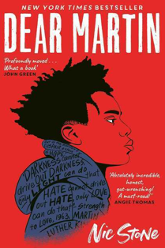 It’s been nearly 52 years since Dr. Martin Luther King, Jr. was assassinated on April 4, 1968. Without a doubt, he continues to inspire new generations and serve as a role model for non-violent protest and change. In honor of Black History Month in February, I’d like to review a young adult novel that brings the conversation on racism and growing up Black in the United States to a new level. It investigates whether King’s teachings are still relevant today and whether they can help Jystice, a 17-year-old, promising high school student. His life is turned upside down when he tries to help his intoxicated ex-girlfriend get home safely one night. In a confrontation with two police officers, Jystice ends up on the ground in handcuffs – an all-too-familiar sight. The problem: She’s White and he’s Black. As a result of the assault, Jystice will never be the person he once was.
It’s been nearly 52 years since Dr. Martin Luther King, Jr. was assassinated on April 4, 1968. Without a doubt, he continues to inspire new generations and serve as a role model for non-violent protest and change. In honor of Black History Month in February, I’d like to review a young adult novel that brings the conversation on racism and growing up Black in the United States to a new level. It investigates whether King’s teachings are still relevant today and whether they can help Jystice, a 17-year-old, promising high school student. His life is turned upside down when he tries to help his intoxicated ex-girlfriend get home safely one night. In a confrontation with two police officers, Jystice ends up on the ground in handcuffs – an all-too-familiar sight. The problem: She’s White and he’s Black. As a result of the assault, Jystice will never be the person he once was.
Nic Stone’s debut novel, Dear Martin (2017), interweaves the topics of racial profiling, police brutality, blackface, colorblind racism, micro-aggressions, and acting ‘White’ with questions of identity, friendship, and interracial relationships. With that list, you might just ask yourself how the author still manages to tell a good story without getting too distracted and preachy. Well, she does. But before exploring the topic further, I’ll let Nic Stone introduce the book in her own words.
https://www.youtube.com/watch?v=UD0RQ4RHZ8Q
Yes, it’s always advantageous if a novel is inspired by real events. Without a doubt, Dear Martin deals with real questions that real people are asking: How can it be that a person is killed over loud music? How can it be that growing up Black makes you a threat to society? What effects does racism in all of its many forms have on individuals? Will Jystice get justice? For some, Dear Martin might be a revelation that allows Black experiences to be seen and their silenced voices to be heard – perhaps for the first time. For others, the novel offers a potential new perspective and an opportunity to get a real conversation going.
In the beginning, readers encounter a talented young man who grew up on the ‘wrong’ side of town, but whose determination and hard work put him on a college prep track to Yale University. Stone shows how fragile that bright future is, how in a blink of an eye, one traumatizing act of racism sets a chain of actions and reactions in motion that affect the victim’s life. Shock leads to confusion; confusion leads to pain, suffering, and violence. And yet, not all is lost. The cost is high and the burden heavy, but don’t count out Jystice just yet.
Both, the novel’s plot and its construction of the characters, are uniquely layered. Dear Martin gives readers a glimpse of what it might feel like to be exposed to racism again and again. Journal entries addressed to MLK – hence the title of the novel – complete some chapters, allowing readers to view the unfolding events through the protagonist’s eyes without the intervention of a narrator. Other chapters include new reports that circulate about events that have just occurred. The infuriating spin put on the ‘truth’ points a critical finger at the fuel both the media and the judicial system add to the fire. While some young adult novelists take a sledgehammer to their message, Stone trusts readers to figure it out by themselves. And this message may just be a bit different for each of us. And that, my dear blog readers, is a sign of excellence.
Dear Martin is a brilliant work of art that’s all about fostering empathy. It’s already used in some German lower-secondary schools in translation, but the book’s international journey has only just begun. Dear Martin needs to get into the hands of teens everywhere. And it wouldn’t hurt adults to read it either.
29,708 Total Views, 2 Views Today






